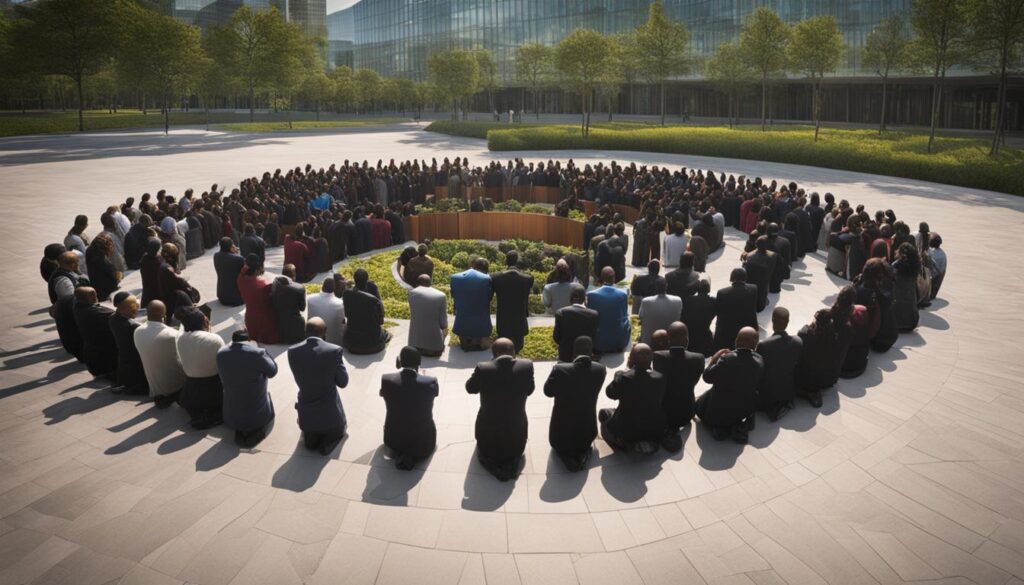Prayer is an integral part of the Christian faith, and a prayer ministry serves as a dedicated platform for intercession and spiritual growth within a church community. The purpose of a prayer ministry is to constantly pray to God on behalf of church leaders and members, fostering a deep and meaningful prayer life. This ministry aims to organize prayer meetings, cultivate a House of Prayer environment, and provide support and guidance to individuals in need. Led by individuals with strong spiritual and natural qualifications, a prayer ministry plays a vital role in nurturing the faith of individuals and building a strong, united church community.
Key Takeaways:
- The purpose of a prayer ministry is to intercede for church leaders and members.
- It aims to encourage and develop a prayer life among church members.
- A prayer ministry plans and conducts prayer meetings and sessions.
- It organizes prayer chains and home-prayer cells.
- The ministry focuses on organizing various prayer activities and services.
Importance of a Prayer Ministry for Spiritual Growth
A prayer ministry holds great significance in fostering spiritual growth among individuals and the entire church community. Through constant intercession and prayer, the ministry helps individuals deepen their relationship with God and experience His guidance, healing, and provision. The prayer ministry plays a vital role in encouraging church members to cultivate a personal prayer life, helping them understand the importance of prayer in their spiritual journey.
By participating in prayer meetings, worship services, and small group prayer sessions, individuals can experience the power of united prayer and connect with others in a meaningful way. These collective prayer experiences create a sense of unity and community within the church, fostering a supportive environment for spiritual growth. The prayer ministry also provides opportunities for individuals to share their prayer needs and receive support from the community, strengthening their faith and encouraging them on their spiritual journey.
Spiritual Growth through Prayer Ministry
The prayer ministry serves as a catalyst for personal transformation, bringing individuals closer to God and fostering a deeper faith. Through intentional prayer and intercession, individuals can experience healing, deliverance, and breakthroughs in various areas of their lives. The ministry provides a safe and confidential space where individuals can share their burdens and receive prayer support. This transformative process not only leads to inner healing but also enhances individuals’ relationship with God and others, allowing them to become who they are meant to be.
Prayer ministry also plays a crucial role in spiritual formation and discipleship. By providing resources such as prayer guides, discipleship materials, and training programs, the ministry equips individuals with the necessary tools and knowledge to grow in their faith. Prayer team members serve as mentors and guides, offering spiritual guidance and support to those seeking to deepen their prayer life and relationship with God.
In conclusion, a prayer ministry is vital for the spiritual growth of individuals and the unity of the church community. It provides a platform for intercession, healing, and transformation, allowing individuals to deepen their relationship with God and experience His love and power. Through collective prayer experiences and support from the community, individuals can grow spiritually and become more rooted in their faith.
Building Community Through a Prayer Ministry
A prayer ministry serves as a powerful tool for building community and fostering unity within the church. It brings individuals together through shared prayer experiences and intercession for others, creating strong bonds and a sense of belonging. The prayer ministry organizes various activities such as home-prayer-cells and prayer chains, where individuals can gather and pray for specific concerns and needs. This sense of community extends beyond the church building, as prayer teams visit hospitals, nursing homes, and prisons to pray with people facing difficult circumstances.
The prayer ministry also plays a collaborative role within the church, working hand-in-hand with other ministries such as men’s, women’s, and youth ministries, as well as the deacon board. By collaborating with these ministries, the prayer ministry ensures comprehensive support through prayer. This collaboration allows the church to address the diverse needs of its members and the community at large. By involving various groups within the church, the prayer ministry effectively brings communities together through faith, enhancing the overall spiritual fabric of the church.
Benefits of Community Building Through a Prayer Ministry
- Stronger relationships: Through shared prayer experiences, individuals develop meaningful connections with fellow church members, strengthening relationships within the community.
- Sense of belonging: The prayer ministry creates a welcoming and inclusive environment where individuals feel valued and accepted, fostering a sense of belonging.
- Support and encouragement: Community-based prayer activities provide individuals with emotional and spiritual support, as they can share their concerns and receive prayer from others.
- Compassionate outreach: The prayer ministry extends its reach beyond the church walls, demonstrating God’s love and compassion by visiting and praying for those in need in hospitals, nursing homes, and prisons.
By building community through a prayer ministry, churches can create a closer-knit, supportive environment where individuals feel connected and cared for. Through prayer and fellowship, the community becomes a source of strength and encouragement, fostering a deeper sense of faith and unity.

Starting a Prayer Ministry
Starting a prayer ministry involves careful planning and organization. The first step is to establish a core team of individuals who are passionate about prayer and have a deep understanding of its importance. This team will serve as the leadership committee for the prayer ministry and will be responsible for setting goals, organizing activities, and overseeing the prayer ministry’s operations.
The prayer ministry should have a clear mission and purpose, outlining its objectives and duties. It is essential to promote and encourage church members to participate in prayer activities through regular communication and engagement. The prayer ministry should also establish specific prayer meeting schedules, including worship services, small group prayer, and special prayer events. To ensure effectiveness, the prayer ministry should provide resources such as training manuals and discipleship materials to equip prayer team members.
By following these steps and fostering a culture of prayer within the church, a successful prayer ministry can be established. The ministry can have a significant impact on the spiritual growth of individuals and the overall unity of the church community. Through intercession, healing, and transformation, the prayer ministry can help individuals deepen their relationship with God and experience His power and love. It is a privilege and a calling to be a part of a prayer ministry, where lives are changed, communities are strengthened, and the Kingdom of God is advanced.
The Role of Prayer Ministry in Personal Transformation
The prayer ministry plays a vital role in personal transformation by addressing and overcoming struggles individuals may face. Through intentional, focused prayer, recipients of prayer ministry can experience healing from anger, unforgiveness, fear, stress, anxiety, shame, trauma, sexual sins, depression, and other undesired behaviors and thought patterns. The prayer ministry helps individuals connect with the heart of God, discover root beliefs, and replace them with God’s truth. This transformative process not only leads to inner healing but also enhances individuals’ relationship with God and others, allowing them to become who they are meant to be.
Prayer ministry provides a safe and confidential environment for individuals to receive prayer and support, allowing for lifelong growth and freedom in Christ. It offers a space where individuals can share their deepest struggles and receive compassionate intercession. By seeking God’s guidance and relying on His power, prayer ministry participants can experience breakthroughs and experience lasting change.
“Through the power of prayer, I have experienced incredible transformation in my own life. God has healed me from past hurts, delivered me from addictions, and given me a renewed sense of purpose. The prayer ministry has played a significant role in my journey of personal growth, providing support and intercession when I needed it most. I am truly grateful for the transformative power of prayer.”
Table: Examples of Personal Transformation through Prayer Ministry
| Struggle | Transformation |
|---|---|
| Depression | Experience joy and renewed hope |
| Addictions | Find freedom and overcome destructive habits |
| Unforgiveness | Experience healing and extend forgiveness to others |
| Anxiety | Discover peace and trust in God’s provision |
| Shame and guilt | Receive God’s forgiveness and experience freedom |
The prayer ministry plays a vital role in personal transformation, bringing individuals closer to God and enabling them to live abundant lives. Through prayer, individuals can experience healing, restoration, and a renewed sense of purpose. The transformative power of prayer ministry is a testament to the love and faithfulness of God, who desires to see His children thrive and live in freedom.
Prayer Ministry Guidelines and Best Practices
A prayer ministry is a sacred responsibility that requires careful attention to guidelines and best practices to ensure its effectiveness and impact. The following guidelines serve as a valuable framework for individuals involved in prayer ministry:
1. Spiritual Preparation
Prayer team members should prioritize their spiritual preparation to effectively minister to others. This involves cultivating a personal prayer life, immersing oneself in God’s Word, and seeking the guidance of the Holy Spirit. By fostering a deep connection with God, prayer team members can effectively intercede and provide support to those in need.
2. Leadership and Vision
It is important to align with the vision and direction set by the church leadership. Prayer team members should support and collaborate with the leadership to ensure unity within the ministry. Additionally, prayer team leaders should set clear objectives and goals for the ministry, empowering team members to work towards a common purpose.
3. Professionalism and Boundaries
Prayer team members should approach their ministry with professionalism, maintaining confidentiality and respecting personal boundaries. It is crucial to recognize the limitations of prayer ministry and seek professional help when necessary. Creating a safe and non-judgmental environment promotes trust and encourages individuals to seek prayer support.
4. Discernment and Accountability
Prayer team members should exhibit discernment when praying for individuals, seeking God’s wisdom and guidance. It is important to pray in pairs, ensuring accountability and providing a supportive environment for team members. Regular check-ins and debriefing sessions can foster personal and spiritual growth within the team.
5. Utilize Scripture and Resources
Integrating God’s Word into prayers can bring power and authority to intercession. Prayer team members should equip themselves with Bibles and helpful discipleship materials to support individuals in their spiritual journey. Providing access to resources and training materials ensures the ongoing development and effectiveness of the prayer ministry.
By adhering to these guidelines and best practices, prayer ministry teams can create a nurturing and impactful environment that fosters spiritual growth, healing, and transformation.
The Future of Prayer Ministry
The future of prayer ministry holds endless possibilities for growth and impact. As technology advances, prayer ministries can leverage digital platforms and virtual sessions to reach a wider audience and provide prayer support globally. The incorporation of multimedia resources, such as online prayer guides and downloadable prayer materials, can enhance the prayer ministry experience for individuals. Integration with other ministries and community outreach programs can enable prayer ministries to extend their impact beyond the church walls. Continual training and development of prayer team members will ensure the effectiveness and relevance of prayer ministry in an ever-changing world. With a focus on innovation, inclusivity, and adaptability, prayer ministries can continue to play a vital role in individual and community transformation for years to come.

Embracing Technology
In the future, prayer ministries can make use of technology to expand their reach and impact. Virtual prayer meetings, live-streamed worship services, and online prayer groups can provide individuals with convenient and accessible options for engaging in prayer. Utilizing social media platforms and mobile applications, prayer ministries can easily communicate prayer requests and provide resources to empower individuals in their prayer lives. Technology can also facilitate global collaborations and partnerships among prayer ministries, allowing for knowledge-sharing and joint initiatives that transcend geographical boundaries.
Personalized Prayer Support
The future of prayer ministry is all about personalization. As prayer ministries gain a deeper understanding of individual needs and concerns, they can offer more tailored prayer support. This can include one-on-one prayer sessions, personalized prayer plans, and targeted resources for specific challenges or circumstances. By recognizing that each person’s prayer journey is unique, prayer ministries can provide the necessary guidance and encouragement for individuals to experience breakthroughs, healing, and transformation.
Community Engagement
Prayer ministries of the future will go beyond the walls of the church and actively engage with the broader community. Collaborations with local organizations, schools, and businesses can create opportunities for prayer ministries to serve and bless their neighborhoods. Prayer walks, community prayer events, and partnerships with social service agencies can demonstrate the tangible impact of prayer and foster a sense of unity and compassion among diverse groups of people. By actively engaging with the community, prayer ministries can become a beacon of hope and positivity, spreading the love of God to those who need it most.
In conclusion, the future of prayer ministry is bright, promising, and full of potential. By embracing technology, providing personalized prayer support, and actively engaging with the community, prayer ministries can continue to make a lasting impact in the lives of individuals and communities. As prayer teams adapt and innovate, they will be equipped to meet the evolving needs and challenges of a changing world, bringing healing, transformation, and unity through the power of prayer.
Conclusion
A prayer ministry plays a vital role in the spiritual growth and unity of a church community. Through constant intercession, individuals can deepen their relationship with God, experience His love, and witness His power in their lives. By fostering a culture of prayer, prayer ministries provide a platform for healing, transformation, and personal growth. They bring communities together, promote a sense of belonging, and strengthen the overall fabric of the church.
The future of prayer ministry holds immense potential for growth and innovation. With advancements in technology, prayer ministries can utilize digital platforms to reach a wider audience and provide prayer support globally. By integrating multimedia resources and collaborating with other ministries, prayer ministries can extend their impact beyond the church walls. Continual training and development of prayer team members will ensure the relevance and effectiveness of prayer ministry in an ever-changing world.
Engaging in prayer ministry is not only a calling but also a privilege. It offers individuals the opportunity to connect with God, participate in His work, and make a lasting impact on the lives of others. Through prayer ministry, lives are changed, communities are strengthened, and the Kingdom of God is advanced. As prayer ministries continue to evolve and adapt, they will continue to play a vital role in individual and community transformation for years to come.
FAQ
What is the purpose of a prayer ministry?
The purpose of a prayer ministry is to intercede to God constantly on behalf of the church leaders and its members. It aims to encourage and motivate church members to develop a prayer life.
How does a prayer ministry foster spiritual growth?
A prayer ministry plays a significant role in fostering spiritual growth among individuals and the entire church community. Through constant intercession and prayer, it helps individuals deepen their relationship with God and experience His guidance, healing, and provision.
How does a prayer ministry build community within the church?
A prayer ministry serves as a powerful tool for building community and fostering unity within the church. Through shared prayer experiences and intercession for others, church members form strong bonds and develop a sense of belonging.
What are the steps to start a prayer ministry?
Starting a prayer ministry involves careful planning and organization. The first step is to establish a core team of individuals who are passionate about prayer and have a deep understanding of its importance. This team will serve as the leadership committee for the prayer ministry and will be responsible for setting goals, organizing activities, and overseeing the prayer ministry’s operations.
How does prayer ministry contribute to personal transformation?
The prayer ministry plays a vital role in personal transformation by addressing and overcoming struggles individuals may face. Through intentional, focused prayer, recipients of prayer ministry can experience healing from anger, unforgiveness, fear, stress, anxiety, shame, trauma, sexual sins, depression, and other undesired behaviors and thought patterns.
What are some best practices for prayer ministry?
Prayer ministry guidelines and best practices are essential for ensuring a fruitful and effective prayer ministry. Prayer team members should be spiritually prepared, both mentally and emotionally, understanding that prayer ministry is a privilege and a ministry. They should take the initiative to ask for guidance when unsure and remain calm in moments of pressure.
What does the future hold for prayer ministry?
The future of prayer ministry holds endless possibilities for growth and impact. As technology advances, prayer ministries can leverage digital platforms and virtual sessions to reach a wider audience and provide prayer support globally. The incorporation of multimedia resources and integration with other ministries and community outreach programs can enable prayer ministries to extend their impact beyond the church walls.









